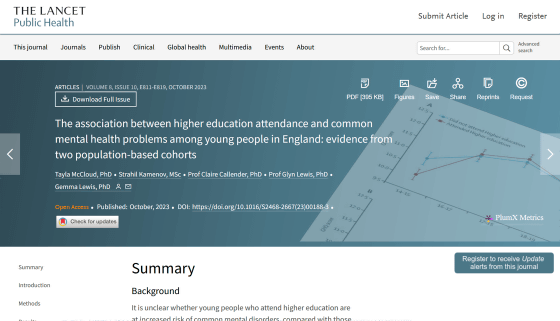Research shows young people attending university are at higher risk of depression and anxiety

In recent years, the deterioration of young people's mental health has become a social problem, and research is underway in various countries to investigate what factors cause mental health to deteriorate. A study conducted by a team at
The association between higher education attendance and common mental health problems among young people in England: evidence from two population-based cohorts - The Lancet Public Health
https://www.thelancet.com/journals/lanpub/article/PIIS2468-2667(23)00188-3/fulltext

New Research: Higher Education Linked to Increased Risk of Depression and Anxiety
https://scitechdaily.com/new-research-higher-education-linked-to-increased-risk-of-depression-and-anxiety/
Generalized anxiety disorder (generalized anxiety disorder) is the most common mental illness, and the incidence of depression increases rapidly in women around the age of 12 to 13 and in men around the age of 16, and the incidence continues to increase into their 20s. Masu. In recent years, there has been an increase in the number of young people who receive higher education such as universities and graduate schools who are suffering from mental health problems, but it is not well understood how the risk of mental illness differs between young people who receive higher education and those who do not. .
In general, parents of young people in higher education are more likely to be better educated and have higher incomes, so based on past research on the effects of socio-economic status on mental health, students are more likely to have stable mental health. It is expected that there will be. However, students are likely to experience more academic, social, and financial stress, which may also have a negative impact on their mental health.

The research team used data from
The subjects included approximately 11,000 people who were born between 1989 and 1990 and were 18 to 19 years old in 2007 to 2009, and those who were born between 1998 and 1999 and were 18 to 19 years old in 2016 to 2018. More than half of the participants in both groups went on to higher education courses such as universities.
After analyzing the data, researchers found that 18- to 19-year-olds with higher education had a slightly higher risk of developing depression and generalized anxiety disorder. This association persisted even after controlling for factors such as socioeconomic status, parental education, and history of alcohol use.
The study suggests that eliminating the potential mental health risks of attending higher education could reduce the incidence of depression and generalized anxiety disorder by 6% among 18- to 19-year-olds. Ta. On the other hand, it has been reported that the difference in mental health risks between the two groups disappears after the age of 25.

Dr Tyra MacLeod , lead author of the paper, said: 'We cannot say why students are at higher risk of depression or generalized anxiety disorder than their peers, but we think it may be related to academic or financial pressures. These results are concerning because students in higher education are, on average, more advantaged and would be expected to have better mental health than young people who are not. 'Further research is needed to clarify the mental health risks associated with this.'
Related Posts:
in Science, Posted by log1h_ik







